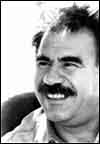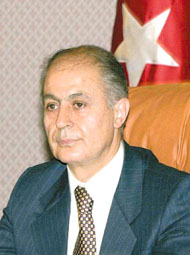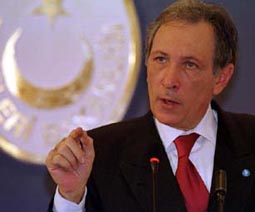23
July 2002
![]()
1. "Turkish PM agrees to early elections", Turkish Prime Minister Bulent Ecevit on Tuesday agreed to go ahead with early elections after his senior right-wing coalition partner threatened to withdraw from the government if they were postponed.
2. "Ocalan's defence statement was perfect", Turgut Okyay, the chief prosecutor at Imrali trial between May 31-June 29, 1999 which imposed on KADEK President Abdullah Ocalan a penalty of death sentence, stated that Ocalan made a "perfect defence" for the unity of Turkish and Kurdish peoples.
3. "The ball is in Sezer's court: DEP case", Yusuf Alatas, lawyer of DEP deputies, in a petition to asked for President of the Republic Sezer, asked him to take action in order to implement "new and a just trial" decision for the DEP deputies by European Court of Human Rights.
4. "Cem vows 'renewal of Turkish life'", Ismail Cem, Turkey's former foreign minister, yesterday promised to work for "renewal of every aspect of Turkish life" as he launched the reformist New Turkey party.
5. "Kurds map out post-Saddam future", Kurdish guerrillas control parts of Iraq.
6. "IMF pleased with Turkey's economic progress, warns over political tensions", Turkey has made good progress under an IMF-backed economic reform program despite a government crisis, but political stability should now be swiftly restored to ensure continued recovery, an IMF official said here Monday. Speaking at the end of a two-week inspection mission, the head of the International Monetary Fund's Turkey desk said political tensions and prospects for early elections in November had unsettled the fragile financial markets.
1. - AFP - "Turkish PM agrees to early elections":
ANKARA / 23 July 2002
Turkish Prime Minister Bulent Ecevit on Tuesday agreed to go ahead
with early elections after his senior right-wing coalition partner threatened
to withdraw from the government if they were postponed.
"There is a general inclination (for early elections). In this situation it has become meaningless for us to oppose early elections on our own," Ecevit told reporters. The ailing prime minister, whose government no longer has a majority in
parliament, tried unsuccessfully at the weekend to delay elections until at least next year, despite an earlier decision to hold polls on November 3.
Ecevit's far-right coalition partner, the Nationalist Action Party (MHP), threatened to quit the government if elections were postponed beyond November. "The MHP's worries are needless," Ecevit said, while adding that he still had reservations over early elections ahead of the scheduled date of April 2004. "We will not come to a position to oppose (early elections) on our own, but it is our right to express our warnings," he said. He denied media reports that he would step down in a bid to delay elections by creating a power vacuum and triggering a possibly lengthy search for a new government.
"If we (his Democratic Left Party) withdraw from the government of our own will, it will lead to new problems," Ecevit said. Ecevit, 77, has categorically rejected increasing calls for his resignation since early May when he fell ill with several ailments and began absenting himself from most official duties. At the same time, his government hit a deadlock on reforms required under Turkey's bid to join the European Union, triggering severe political uncertainty that has rocked fragile financial markets.
His refusal not to resign led to mass resignations from
the DSP, once the biggest party in parliament, leaving it with only
65 seats. The defections have ended the parliament majority of the government,
which now holds only 271 seats in the 550-member house. ![]()
2. - Kurdish Observer - "Ocalan's defence statement was perfect":
22 July 2002
Turgut Okyay, the chief prosecutor at Imrali trial between May 31-June
29, 1999 which imposed on KADEK President Abdullah Ocalan a penalty
of death sentence, stated that Ocalan made a "perfect defence"
for the unity of Turkish and Kurdish peoples.
Participated in the "Sisler Bulvari" program on Kanal 6 Channel, Turgut Okyay had this to say: "I believe that Abdullah Ocalan has clearly understood that Turks and Kurds cannot be separated despite of the efforts of the outside forces. These two peoples cannot be separated from each other. I am of opinion that as he believes that he has made his defence in this line. For me he has made a perfect defence as far as both he and we are concerned. But the court has also made it easy for him. Even Abdullah Ocalan has prevented some requests of his lawyers which could arise problems or some illogical requests."
Reminding that all civilized countries had lifted the
capital punishment. Turgut Okyay continued to say the following: "We
have not implemented capital punishment de facto since 1984. Why do
not we lift a penalty as it is already not implemented? I am, like every
intellectual, against capital punishment. To this day nobody has seen
a benefit of the capital punishment. On the contrary, it has had adverse
effects on societies. It is not suitable for interests of our country."
![]()
3. - Ozgur Politika - "The ball is in Sezer's court: DEP case":
Yusuf Alatas, lawyer of DEP deputies, in a petition to asked for President of the Republic Sezer, asked him to take action in order to implement "new and a just trial" decision for the DEP deputies by European Court of Human Rights.
ANKARA / 22 July 2002
Yusuf Alatas, lawyer of the closed DEP (Democracy Party) deputies,
submitted a petition to President of the Republic Ahmet Necdet Sezer,
requesting to take action in order to implement the decision of European
Court of Human Rights (ECHR) for a "renewed an just trial"
of the deputies Leyla Zana, Hatip Dicle, Orhan Dogan and Selim Sadak.
Reminding that the European Council had warned Turkey to implement the
rule, the lawyer stressed that in case that the warning were not be
taken into consideration, they would applied the EC requesting to dismiss
Turkey from membership. Turkey has violated the international agreements
it had ratified and put the deputies into prison.
In reply to the request, Sezer stated that the application was sent to the Justice Ministry to be examined.
Alatas, criticising that the Ministry had treated his petition as an ordinary one, had this to say: "Unfortunately the Justice Ministry sent the petition to Ankara State Security Court (DGM) without any preparations and proceedings. And the DGM Chief Prosecution Office has sent it to Ankara DGM No.1 with a negative view. Then the Court No.1 ruled that the request to be rejected. Therefore there are no proceeding to implement the EHRC rule."
Prime Ministry did not reply
Saying that one month after submitting his petition to the Presidency, he had also sent a similar petition to the Prime Ministry, Alatas criticised that his petition had not been replied.
Turkey can be discarded from the council
Alatas underscored that Turkey was a member of the European Council and it was binding by the European Council Charter, reminding that article 46 of ECHR had given authority to the EC Council of Ministers to observe the ECHR rules. The lawyer said that in case that Turkey was insistent to implement the ECHR rules in spite of the warning of the Council of Ministers, there would be grave adverse effects for Turkey. Yusuf Alatas emphasized that the insistence on behalf of Turkey was considered "a grave violation" of article 3 of the European Council Charter which deals with "order of the law" and article 6 was brought into agenda as a sanction. According to the article 6, a state which does not comply with the Council's rules, may be discarded from the council.
Drawing attention that that insistence of Turkey to this
day urged them to request from the Council to impose a sanction on turkey,
Alatas concluded his petition with words to the effect: "We consider
it a very serious injustice to urge us to request our own country to
be discarded from EC and wish to intervene." ![]()
4. - Financial Times - "Cem vows 'renewal of Turkish life'":
ANKARA / 23 July 2002 / by Leyla Boulton in Ankara
Ismail Cem, Turkey's former foreign minister, yesterday promised
to work for "renewal of every aspect of Turkish life" as he
launched the reformist New Turkey party.
Mr Cem embraced the prospect of early elections in November as Turkey's fragile financial markets dipped on suggestions by Bulent Ecevit, prime minister, that polls should be delayed until next year.
"We see that Turkey has limited time," Mr Cem said, contradicting Mr Ecevit, whose Democratic Left party he deserted just over two weeks ago.
Mr Ecevit, who has agreed to early polls despite mis-givings, was quoted yesterday as saying that elections would benefit only Islamists or Kurdish separatists.
Electoral gains by Recep Tayyip Erdogan, the former Islamist mayor of Istanbul seen by opinion polls as gaining the most seats in parliament, or by Hadep, the Kurdish-dominated party, would threaten the "regime", Mr Ecevit said.
Mr Ecevit was referring to Turkey's secular democracy and territorial integrity - which the influential armed forces have vowed to defend.
While denying that he was motivated by the likely poor performance of his DSP, whose parliamentary presence has been halved by defections in the past two weeks, Mr Ecevit also said the public had yet to see the benefits of bold economic reforms pursued by his three-party coalition.
Still in the pipeline, Mr Ecevit claimed, were human rights reforms needed to advance Turkey's candidacy for membership of the European Union.
Devlet Bahceli, leader of the far right National Action party (MHP), now the biggest party in parliament, clarified the deadline for Mr Ecevit by threatening to pull out of the coalition government if elections are not held in November.
"If elections are postponed past November 3 or if cond-itions develop that make it [elections] effectively impossible, it's clear it will be no longer possible for the MHP to have the responsibility of continuing as part of this government," he said. "A development like this would invite a crisis situation."
The International Monetary Fund, at the sharp end of Turkey's political uncertainty with its $16.3bn (ý10.3bn) loan for a three-year economic stabilisation plan, yesterday expressed hope that any future government would stick to the current plan.
Juha Kahkonen, the IMF's Turkey desk chief, said before leaving Ankara last night that the growth target of 3 per cent this year was achievable thanks to Turkey's strong implementation of the programme so far.
He also noted that a recent damaging increase in Turkish
interest rates could be reversed with a combination of continued reforms
and moves to end two months of political uncertainty. ![]()
5. - BBC - "Kurds map out post-Saddam future":
Kurdish guerrillas control parts of Iraq
22 July 2002 / by Hiwa Osman In Iraqi Kurdistan 
As the likelihood of a US-led campaign to effect a "regime
change" in Iraq increases, the Kurds are formulating their vision
and strategy for the country post-Saddam Hussein.
The Kurdistan Democratic Party (KDP) and the Patriotic Union of Kurdistan (PUK) have been ruling two-thirds of Iraq's Kurdish region for the past 11 years, outside Baghdad's control.
The Kurds are seen as key players if there is any US-led campaign in Iraq - either as part of the campaign against Baghdad or as a safe haven for fleeing refugees if the war starts.
But the Kurds have been wary of taking any steps or declaring any positions before receiving "concrete guarantees and assurances" of their place in a future Iraq.
Kurdish vision
"This is the very first time in our contemporary political history that we are articulating our vision for what we want," said Dr Barham Salih the head of the PUK-led administration in Sulaymaniyah.
"We are not interested in changing a dictator for another one," he added.
"We want a democratic and federal Iraq, in which the Kurds can live as first class citizens and as full partners to other Iraqis in the government."
Despite their division on a number of issues, the Iraqi Kurds seem to be united on their vision for the future.
In a recent address in Arbil, the head of the KDP-led administration, Nechirvan Barzani said: "Many times we get accused of wanting to create a Kurdish state or separate ourselves from Iraq.
"Kurds' rights can be realised within the framework of a democratic and federal Iraq."
Democracy
A democratic Iraq seems to be at the core of the Kurdish agenda.
Kurdish strategy seems to have shifted from confining themselves to the Kurdish region to being "full partners" in the running of the country
Historically, successive Iraqi governments signed deals and gave promises of rights to the Kurds, but these were quickly revoked for various reasons.
Barham Salih said that if the international community - including the US - wants a stable Iraq at peace with its neighbours, they should support the Iraqi people to bring about a democratic and representative government.
Federalism
It proposes a "Federal Republic of Iraq" consisting of two regions - an Arab one and the Iraqi Kurdistan region.
The KDP leader Massoud Barzani says the proposal is open for discussion. But, he says, "the one thing that is not negotiable is the principle of federalism".
The document states that each region would have its own constitution and a freely elected president and parliament, with powers ranging from taxation and internal security to initiating international relations.
It also details the relationship between the Kurdish region and federal authorities in Baghdad, where a federal court, an elected assembly and president would reside.
The federal authorities in Baghdad would have the power
to:
Declare war and make peace,
Decide foreign policy,
Sign international treaties,
Set general economic policy,
Control Iraq's oil wealth and nuclear energy programme,
Issue federal legislation.
The federal parliament would comprise an assembly of representatives, with members elected from all over Iraq, and an assembly of the regions, with equal number of representatives for each region.
Presence in Baghdad is also viewed as important. They believe their problem will not be solved until "the problem of Iraq" is solved, according to Barham Salih.
The Kurds' strategy seems to have shifted from confining
themselves to the Kurdish region to being "full partners"
in the running of the country. ![]()
6. - AFP - "IMF pleased with Turkey's economic progress, warns over political tensions":
ANKARA / 22 July 2002 / by Sibel Utku
Turkey has made good progress under an IMF-backed economic reform
program despite a government crisis, but political stability should
now be swiftly restored to ensure continued recovery, an IMF official
said here Monday. Speaking at the end of a two-week inspection mission,
the head of the International Monetary Fund's Turkey desk said political
tensions and prospects for early elections in November had unsettled
the fragile financial markets.
"Nevertheless, the economic performance -- growth and disinflation -- has been good. We believe the program's macro-economic targets for 2002 remain well within range," Juha Kahkonen told reporters. He said the fiscal and monetary policies of Prime Minister Bulent Ecevit's embattled government had been "very sound" and that a 35-percent inflation rate and three-precent growth for 2002 remained "very realistic" targets. The IMF executive board is now expected to meet next month to decide on the release of a 1.1-billion-dollar installment from a 16-billion-dollar credit it has accorded Turkey.
But Kahkonen cautioned against high interest rates, which have shot up by more than 20 percentage points from about 50 percent in late May when political uncertainty gripped the country as Ecevit fell ill and his coalition hit a deadlock over EU-demanded democracy reforms. Rising interest rates have put an additional burden on the treasury's borrowing costs, triggering doubts about the roll-over of a hefty debt stock.
"It is important for the government to deliver on the measures (to which) it has committed itself ... Resolution of political uncertainty will help decrease interest rates," Kahkonen said. "Even if interest rates have some dampening effect, three percent (in growth) will be achievable... because (growth in) the first quarter was very strong and there are indications that the second quarter was also strong," he added. The current turmoil erupted at a time when the economy, which shrank by 9.4 percent last year, was showing signs of improvement, including a continued easing of inflation and an unexpected 0.7-percent growth rate in the first quarter.
As political leaders continued to wrangle over early polls on Monday, shares at the Istanbul stock exchange plunged 3.4 percent following massive gains on the prospect of snap polls last week. "Strong efforts continue to be needed to keep the program on track," Kahkonen stressed. He said early elections could delay reforms where legislation was needed but praised the government for "their full commitment to continue implementing" the program. The IMF official urged Ankara to speed up privatization and also to submit to parliament a law for strengthened public financial management, a key condition for the release of the 1.1-billion-dollar tranche.
He expressed hope that a government change would not damage
economic recovery because "the exisiting strategy seems to have
quite a lot of support in various parts of the political scene and the
private sector."The IMF has thrice rescued Turkey from financial
turmoil in the past two years, as the country plunged into one of its
worst ever recessions, and has allocated loans totalling about 30 billion
dollars since 1999. Kahkonen declined to comment on whether a possible
US attack on Turkey's neighbor Iraq could affect the Turkish economy
and bring about the need for additional loans. ![]()